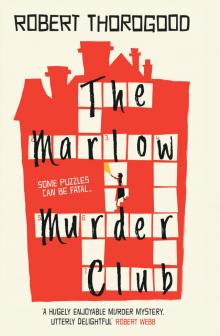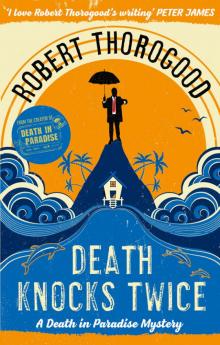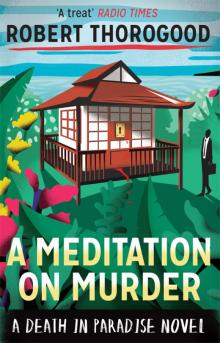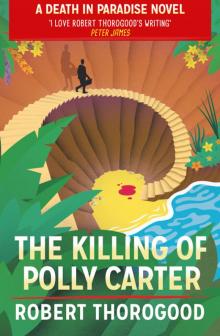- Home
- Robert Thorogood
The Marlow Murder Club
The Marlow Murder Club Read online
Praise for Robert Thorogood
‘Very funny and dark with great pace. I love Robert Thorogood’s writing’
Peter James
‘This is a gem’
Daily Express
‘Deftly entertaining … satisfyingly pushes all the requisite Agatha Christie-style buttons’
Independent
‘For fans of Agatha Christie’
Mail on Sunday
‘A treat’
Radio Times
‘This brilliantly crafted, hugely enjoyable and suitably goosebump-inducing novel is an utter delight from start to finish’
Heat
ROBERT THOROGOOD is the creator of the hit BBC One TV series Death in Paradise, and he has written a series of spin-off novels featuring detective DI Richard Poole.
He was born in Colchester, Essex. When he was ten years old, he read his first proper novel – Agatha Christie’s Peril at End House – and he’s been in love with the genre ever since.
He now lives in Marlow in Buckinghamshire with his wife, children and two whippets called Wally and Evie.
Follow him on Twitter @robthor
Also by Robert Thorogood
A Meditation on Murder
The Killing of Polly Carter
Death Knocks Twice
Murder in the Caribbean
Copyright
An imprint of HarperCollins Publishers Ltd
1 London Bridge Street
London SE1 9GF
First published in Great Britain by HQ in 2021
Copyright © Robert Thorogood 2021
Robert Thorogood asserts the moral right to be identified as the author of this work.
A catalogue record for this book is available from the British Library.
This novel is entirely a work of fiction. The names, characters and incidents portrayed in it are the work of the author’s imagination. Any resemblance to actual persons, living or dead, events or localities is entirely coincidental.
All rights reserved under International and Pan-American Copyright Conventions. By payment of the required fees, you have been granted the non-exclusive, non-transferable right to access and read the text of this e-book on-screen. No part of this text may be reproduced, transmitted, downloaded, decompiled, reverse engineered, or stored in or introduced into any information storage and retrieval system, in any form or by any means, whether electronic or mechanical, now known or hereinafter invented, without the express written permission of HarperCollins.
Ebook Edition © January 2021 ISBN: 9780008238261
Version 2020-12-18
Note to Readers
This ebook contains the following accessibility features which, if supported by your device, can be accessed via your ereader/accessibility settings:
Change of font size and line height
Change of background and font colours
Change of font
Change justification
Text to speech
Page numbers taken from the following print edition: ISBN 9780008238247
For Katie B
Contents
Cover
Praise
About the Author
Booklist
Title Page
Copyright
Note to Readers
Dedication
Chapter 1
Chapter 2
Chapter 3
Chapter 4
Chapter 5
Chapter 6
Chapter 7
Chapter 8
Chapter 9
Chapter 10
Chapter 11
Chapter 12
Chapter 13
Chapter 14
Chapter 15
Chapter 16
Chapter 17
Chapter 18
Chapter 19
Chapter 20
Chapter 21
Chapter 22
Chapter 23
Chapter 24
Chapter 25
Chapter 26
Chapter 27
Chapter 28
Chapter 29
Chapter 30
Chapter 31
Chapter 32
Chapter 33
Chapter 34
Chapter 35
Chapter 36
Chapter 37
Chapter 38
Chapter 39
Acknowledgements
Extract
Prologue
About the Publisher
Chapter 1
Mrs Judith Potts was seventy-seven years old and entirely happy with her life. She lived in an Arts and Crafts mansion on the River Thames, she had a job she loved that took up just enough of her time and no more, and best of all, she didn’t have to share her life with any man. This meant there was no one asking her what was for dinner that night, or wanting to know where she was going every time she left the house, or moaning that she was spending too much money on whisky, a small glass of which she’d have at about 6 p.m. each evening.
On the day Judith’s life changed, it was the height of summer and England had been in the grip of a heatwave for weeks. She’d kept all of her windows open to capture whatever breezes blew down the valley, but it seemed to make no difference. The heat of the sun had got into the bricks and timbers of her home; into the oak staircase and minstrels’ gallery.
After taking her evening meal in front of the television news, she put her empty plate to one side and got out the latest copy of Puzzler magazine. She turned to a logic grid and started to work on it. Usually, she enjoyed reducing the language of the clues down to mathematical ones and zeros, but tonight her heart just wasn’t in it. It was too hot to concentrate.
Judith’s hand idly went to the key she kept on a chain around her neck, and her thoughts began to drift into the past, into a much darker time. She shot up from her chair. This wouldn’t do, she told herself. Wouldn’t do at all. There was always something else she could do to keep herself busy. She needed a change of scene, that was all, and she had the perfect solution.
Judith began to take off her clothes. With each garment she removed, she felt more and more released from the stifling constraints of the day. By the time she was naked, she was buzzing with an impish delight. She crossed the hallway, past the Blüthner grand piano she only ever played when she was really very drunk, and took up a dark grey woollen cape she kept by the front door.
Judith’s cape was her most treasured possession. She’d tell anyone who asked, and many did, that it kept her warm in winter, served as a picnic blanket in the summer, and she could pull it over her head if ever she was caught in a spring shower.
Best of all, Judith believed it was a cloak of invisibility. Every evening, come rain or shine, she’d take off her clothes, wrap the cape around herself and step out of her house feeling a delicious frisson of naughtiness. She would plunge her feet into a pair of ancient wellies and stride through the knee-high grass – swish, swish, swish! – to her boathouse. Like the rest of Judith’s house, it was pink-bricked, timber-framed, and somewhat crumbling.
Judith entered the cobwebby darkness and kicked off her wellies. She hung her cape on an old hook, and, still hidden from the outside world by a pair of ancient boathouse doors, stepped down the stone slipway and into the Thames.
It was almost a religious experience for her, accepting the cold water onto her skin, and she exhaled with a whoosh as she leant forward into the embrace of the river. Suddenly she was weightless, supported by the soft water that felt like silk to her body.
She swam upstream, the evening sunshine flashing diamonds on the water all around. Judith smiled to herself. She always smiled to herself when she was out swimming. She couldn’t help it. After all, there mig
ht be dog walkers on the Thames Path, and there were very definitely plenty of people in the near distance as she looked at the spire of Marlow church and the span of the Victorian suspension bridge that linked the town to the neighbouring village of Bisham. None of these people were aware that there was a seventy-seven-year-old woman swimming nearby entirely in the nude.
It was just as Judith was thinking, This is the life, that she heard a shout.
It came from the opposite riverbank, from somewhere near her neighbour Stefan Dunwoody’s house. But from her position low in the water it was hard for Judith to see exactly what was going on. Only the roof of Stefan’s house was visible above the thick bank of bulrushes at the edge of the river.
Judith strained her ears, but all was quiet. She decided it must have been an animal. A dog or a fox maybe.
And then she heard a man’s voice call out, ‘Hey, no!’
What on earth was that?
‘Stefan, is that you?’ Judith called from the river, but her words were cut short by the sharp retort of a gunshot.
‘Stefan?’ she shouted again, panic rising. ‘Are you all right?’
All was silence. But Judith knew what she’d heard. Someone had fired a gun, hadn’t they? And Stefan’s voice had called out immediately beforehand. What if he was now bleeding from a bullet wound and needed saving?
Judith swam towards Stefan’s house as fast as she could, but as she reached his riverbank, she realised she had a problem. Beyond the bulrushes, Stefan had put corrugated metal across the span of his lawn to protect it from river erosion. Judith knew that swimming through the rushes would cut her body to shreds, and even if she made it to land, she wouldn’t be able to pull herself out. She wouldn’t have the strength.
Ahead of her she could see a blue canoe wedged in among the reeds. Could she somehow use it to help lever her body out of the water? She tried to grab hold of the end, but she couldn’t get a proper grip, it kept bobbing around like a cork, and she realised she didn’t have the balance to climb up onto the canoe anyway. But she gave it one last go, and this time just about managed to pull herself up onto the back of it. And then, oh so slowly, she and the canoe barrel-rolled over, she lost her hold and fell back into the water with an ungainly splash.
She came up for air and shook the water from her hair. The canoe was out of the question, so what else could she do?
Judith swam back to the centre of the river, desperately looking for someone who could help. Where were the dog walkers or canoodling couples when you needed them? She couldn’t see anyone. There was only one thing for it. She turned and swam for home as fast as she could.
Reaching her boathouse, Judith climbed out of the water, wheezing, but there was no time to lose. She threw on her cape and strode out onto the lawn, turning back to look at what she could see of Stefan’s house. Only half of his garden was visible behind the weeping willow that grew unchecked on her side of the riverbank.
She ran into her house, grabbed up her phone and dialled 999. As she waited for the call to connect, she moved over to the bay window to keep an eye on Stefan’s property.
‘I need the police!’ Judith said as soon as the call was answered. ‘There’s been a shooting at my neighbour’s house! Hurry! Someone’s been shot!’
The operator took down the details of Stefan’s address, recorded what Judith had seen, informed her that the emergency services would be on their way, and then ended the call. Judith felt deeply frustrated. Surely there was something else she could do, or someone else she could phone? What about the Coastguard? It was a waterside catastrophe after all. Or the RNLI?
Judith peered out of her window at Stefan’s property. It was still sitting there, apparently innocently, in the evening sunshine.
If anyone had been out on the river at that precise moment, and had had occasion to look up at Judith’s mansion, they’d have seen a very short and comfortably plump woman in her late seventies with wild grey hair standing entirely naked in her bay window, a cape over her shoulders as if she were some kind of a superhero. Which in many ways she was.
She just didn’t know it yet.
Chapter 2
Half an hour later, Judith saw a police car arrive at Stefan’s property and a uniformed police officer get out. Judith tried as best she could to keep her binoculars trained on him as he looked in through the windows of Stefan’s house and took a wander through the garden. She wanted to bellow across the river that the man should jolly well look harder, but she bit her tongue. She had to believe that he knew what he was doing, and he’d find evidence of whatever it was that had happened.
However, after twenty minutes of what Judith could only describe as a cursory search, the police officer returned to his car, got in and drove away.
Was that it? The man had barely explored the garden, and he’d not even entered Stefan’s house. Perhaps he’d gone to get reinforcements? So she kept on looking. And looking.
At midnight, Judith discovered that there was no more whisky in the decanter on the little table to her side. That was always a sign to go to bed. As she woozily ascended the heavy oak staircase, she found she had to hold onto the banister a bit more tightly than normal. She then turned left to go to her bedroom when her bedroom was really on her right, but once she’d corrected her course via a brief tangle with a recalcitrant aspidistra, she safely made her destination.
Judith adored her bedroom. The wood panels were painted light green, and there was a majestic four-poster bed with a tapestry of a medieval hunting scene as its canopy. That the room was covered in old clothes, half-finished meals, and piles of discarded newspapers and magazines didn’t bother her one jot. Judith never noticed the mess. In fact, she let it encompass her in the same way that she let the river embrace her when she went swimming. The messier her bedroom, the more she felt cocooned and safe.
The following morning, Judith was woken by the sound of the phone ringing. She reached for it, blearily seeing it had just gone 10 a.m.
‘Hello,’ she croaked.
‘Good morning,’ an efficient female voice said. ‘My name’s Detective Sergeant Tanika Malik from the Maidenhead police station. I’m following up on the incident you reported at Mr Dunwoody’s property last night.’
‘Ah, thank you for calling,’ Judith said, still somewhat groggily.
The detective sergeant explained that she’d sent a constable to inspect Mr Dunwoody’s house and garden. He’d not found anything of note, so she was ringing to inform Judith that there was nothing to worry about.
‘But I know what I heard!’ Judith said.
‘Yes, the report said you heard a gunshot.’
‘Not just a gunshot. I heard someone call out something like “Hey, no!” and then I heard the gunshot.’
‘But I understand you were swimming in the river at the time. Are you sure it was in fact a gunshot?’
Judith was now fully awake, and thoroughly irritated.
‘I grew up on a farm. I know what a gun sounds like.’
‘But what if it was something else?’
‘Like what?’
‘Well, for example, maybe it was a car backfiring?’
This hadn’t occurred to Judith. She thought for a moment before answering.
‘No. I’m sure I’d have known if it were a car. It was a gunshot. I take it this constable of yours reported that Stefan’s car is still parked at his house?’
‘Why do you mention that?’
‘Because I presume Stefan didn’t answer his phone when you called him, did he?’
‘No, I’m sorry, I can’t quite follow your line of thought there. What phone call?’
‘You must have phoned him last night.’
‘I’m afraid I’m not allowed to share specific details with you.’
‘But a neighbour reports a shooting at a house, of course you phoned to check up on him. And the fact you haven’t told me he answered suggests to me that he didn’t answer. So, seeing as his car is still on his driv
eway, well, that tells me that something’s up with him. After all, if you’re at home, you answer your phone. If you’re away, you take your car. At least someone who owned a car would. I don’t.’
DS Malik didn’t respond immediately.
‘You’ve really thought this through,’ she eventually said.
‘It’s all I could think about last night. I was so worried for Stefan. What if he’s been shot, and the gunman’s escaped? In fact, what if Stefan is right now lying bleeding in a ditch?’
‘I don’t think he’s lying in a ditch. I’m sure there’s some very innocent explanation for all of this. There wasn’t any indication at his property that anything untoward had happened, and it’s not that unusual for someone to ignore their phone. It’s holiday season. People are away. I’m sure Mr Dunwoody will turn up in the next few days. And the moment he does, I’ll let you know. Really, there’s nothing to worry about.’
DS Malik ended the call by thanking Judith for being such a civic-minded neighbour and then rung off.
Afterwards, Judith lay in bed not knowing what to do. Was DS Malik right? Was there in fact a far more innocent explanation for what she’d heard the night before? After all, Judith knew one thing for sure: murders just didn’t happen in Marlow.
She decided to put the matter from her mind, and get on with her work for the day.
When Judith had inherited her house from her great aunt Betty in 1976, she’d also received a portfolio of shares that provided her with a modest income, so she didn’t have much need to work for a living, but nothing would have ever made Judith give up her job. She loved it too much.
Judith compiled crosswords for the national newspapers. She set two or three a week, and the hours she spent each day working on the puzzles were a cherished refuge for her mind. When she was setting a crossword, a calm descended on her and she could lose herself for whole stretches of time as she carefully worked through all the permutations of a particularly satisfying anagram, or considered an elegant phrase or word which could be interpreted in more than one way.

 Murder in the Caribbean
Murder in the Caribbean The Marlow Murder Club
The Marlow Murder Club Death Knocks Twice
Death Knocks Twice A Meditation on Murder
A Meditation on Murder Killing Of Polly Carter
Killing Of Polly Carter